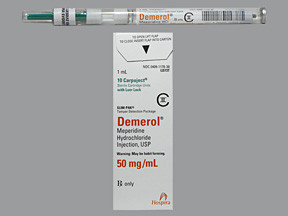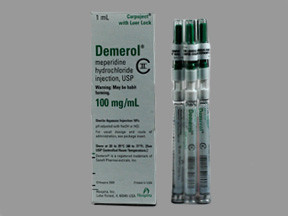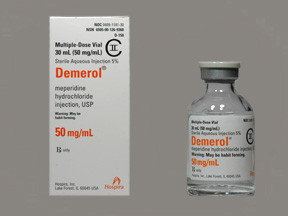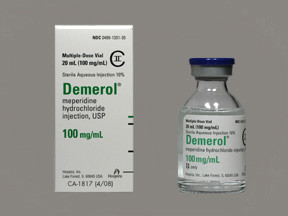MEPERIDINE - INJECTION
PHONETIC PRONUNCIATION: (me-PER-i-deen)
COMMON BRAND NAME(S): Demerol
GENERIC NAME(S): meperidine HCl
Uses
USES: Meperidine is used to help relieve moderate to severe pain. It may also be used before and during surgery or other procedures. Meperidine belongs to a class of drugs known as opioid (narcotic) analgesics and is similar to morphine. It works in the brain to change how your body feels and responds to pain. Meperidine should not be used to treat long-term or ongoing pain. It should only be used to treat sudden episodes of moderate to severe pain. See also Precautions section.
How to use MEPERIDINE - INJECTION
HOW TO USE: This medication is given by injection into a vein, into a muscle, or under the skin as directed by your doctor. If you are giving this medication to yourself at home, learn all preparation and usage instructions from your health care professional. Before using, check this product visually for particles or discoloration. If either is present, do not use the liquid. Learn how to store and discard medical supplies safely. When meperidine is injected into a vein, it is given very slowly to prevent serious side effects. If this medication is given into a muscle or under the skin, it is important to change the injection site each time to lessen injury under the skin. You should be lying down when the injection is given to prevent side effects such as dizziness. The dosage is based on your medical condition and response to treatment. Do not increase your dose or use this drug more often or for longer than prescribed because your risk of side effects may increase. Properly stop the medication when so directed. Pain medications work best if they are used as the first signs of pain occur. If you wait until the pain has worsened, the medication may not work as well. If you have nausea, ask your doctor or pharmacist for ways to decrease it (such as lying down with as little head movement as possible). This medication may cause withdrawal reactions, especially if it has been used regularly for a long time or in high doses. In such cases, withdrawal symptoms (such as restlessness, watering eyes, runny nose, nausea, sweating, muscle aches) may occur if you suddenly stop using this medication. To prevent withdrawal reactions, your doctor may reduce your dose gradually. Ask your doctor or pharmacist for more details, and report any withdrawal reactions right away. When this medication is used for a long time, it may not work as well. Talk with your doctor if this medication stops working well. Though it helps many people, this medication may sometimes cause addiction. This risk may be higher if you have a substance use disorder (such as overuse of or addiction to drugs/alcohol). Use this medication exactly as prescribed to lower the risk of addiction. Ask your doctor or pharmacist for more details. Tell your doctor if your pain persists or worsens.
Side Effects
Precautions
Interactions
Overdose
Images
Reviews
Faq for MEPERIDINE - INJECTION
- Meperidine injection is used to treat moderate to severe pain.
- Meperidine works by blocking the brain's perception and response to pain.
- Some common side effects include dizziness, drowsiness, nausea, vomiting, constipation, and sweating. Rare but serious side effects may include shallow breathing, confusion, seizures, and allergic reactions.
- Meperidine is usually injected into a muscle, vein, or under the skin by a healthcare professional. The dosage and frequency of administration will depend on the severity of pain and individual patient factors.
- Meperidine injection is typically administered in a healthcare setting such as a hospital or clinic. However, in some cases, it may be prescribed for home use with proper instructions and supervision from a healthcare professional.
- Meperidine has the potential to be habit-forming if used for a long duration or in high doses. It should be used only as prescribed and under the supervision of a healthcare professional.
- Meperidine can interact with other medications, such as sedatives, tranquilizers, antidepressants, and certain antibiotics. It is important to inform your healthcare provider about all medications you are taking to avoid potential interactions.
- The use of Meperidine during pregnancy or breastfeeding is generally not recommended, as it may harm the unborn baby or pass into breast milk. Consult with a healthcare professional for appropriate alternatives or considerations.
- Since Meperidine injection is usually administered by a healthcare professional, it is unlikely to miss a dose. If you have any concerns or missed doses while at home, contact your healthcare provider for guidance.
Warning
WARNING: Meperidine has a risk for abuse and addiction, which can lead to overdose and death. Meperidine may also cause severe, possibly fatal, breathing problems. To lower your risk, your doctor should have you use the smallest dose of meperidine that works, and use it for the shortest possible time. See also How to Use section for more information about addiction. The risk for severe breathing problems is higher when you start this medication and after a dose increase, or if you use the wrong dose/strength. Using this medication with alcohol or other drugs that can cause drowsiness or breathing problems may cause very serious side effects, including death. Also, other medications can affect the removal of meperidine from your body, which may affect how meperidine works. Be sure you know how to use meperidine and what other drugs you should avoid using with it. See also Drug Interactions section. Get medical help right away if any of these very serious side effects occur: slow/shallow breathing, unusual lightheadedness, severe drowsiness/dizziness, difficulty waking up. Keep this medicine in a safe place to prevent theft, misuse, or abuse. If someone accidentally swallows this drug, get medical help right away. Before using this medication, women of childbearing age should talk with their doctor(s) about the risks and benefits. Tell your doctor if you are pregnant or if you plan to become pregnant. During pregnancy, this medication should be used only when clearly needed. It may slightly increase the risk of birth defects if used during the first two months of pregnancy. Also, using it for a long time or in high doses near the expected delivery date may harm the unborn baby. To lessen the risk, take the smallest effective dose for the shortest possible time. Babies born to mothers who use this drug for a long time may develop severe (possibly fatal) withdrawal symptoms. Tell the doctor right away if you notice any symptoms in your newborn baby such as crying that doesn't stop, slow/shallow breathing, irritability, shaking, vomiting, diarrhea, poor feeding, or difficulty gaining weight.
Disclaimer
IMPORTANT: HOW TO USE THIS INFORMATION: This is a summary and does NOT have all possible information about this product. This information does not assure that this product is safe, effective, or appropriate for you. This information is not individual medical advice and does not substitute for the advice of your health care professional. Always ask your health care professional for complete information about this product and your specific health needs.





No Reviews Yet